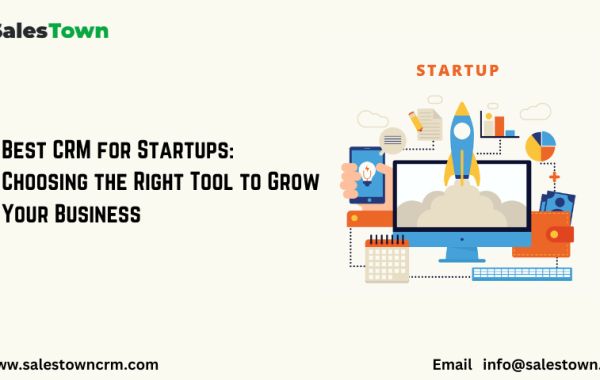Best CRM for Startups: Choosing the Right Tool to Grow Your Business
Starting a new business is exciting, but it can also be overwhelming. As a startup founder, you're juggling many tasks, from product development to marketing and sales. One tool that can help you manage your growing customer base and streamline your operations is a (Customer Relationship Management) CRM software. In this article, we'll explore the best CRM options for startups and help you choose the right one for your business.
Why Does Your Startup Need a CRM?
Before we dive into specific CRM recommendations, let's understand why a CRM is crucial for startups:
- Organize customer information: Keep all your customer data in one place, making it easy to access and update.
- Track sales progress: Monitor your sales pipeline and see where each potential deal stands.
- Improve customer service: Provide better support by having a complete history of customer interactions.
- Automate tasks: Save time by automating repetitive tasks like follow-up emails or appointment reminders.
- Generate reports: Get insights into your business performance with easy-to-understand reports and analytics.
Now that we know why a CRM is important, let's look at some of the best options for startups.
Top CRM Options for Startups
- HubSpot CRM
HubSpot CRM is a popular choice for startups due to its free basic plan and user-friendly interface. It offers a wide range of features that can grow with your business.
Pros:
- Free basic plan with essential features
- Easy to use and set up
- Integrates well with other HubSpot tools and third-party apps
- Includes marketing and customer service features
Cons:
- Paid plans can be expensive as you scale
- Some advanced features require upgrading to paid plans
Best for: Startups looking for a free, easy-to-use CRM with room to grow.
- Salesforce Essentials
Salesforce is a leader in the CRM industry, and their Essentials plan is designed specifically for small businesses and startups.
Pros:
- Powerful features and customization options
- Scalable as your business grows
- Large app ecosystem for integrations
- Strong reporting and analytics capabilities
Cons:
- Steeper learning curve compared to simpler CRMs
- Can be expensive as you add more users or features
Best for: Startups that anticipate rapid growth and need a robust, scalable CRM solution.
- Pipedrive
Pipedrive is a sales-focused CRM that's known for its intuitive interface and visual sales pipeline.
Pros:
- Simple, visual approach to sales management
- Affordable pricing plans
- Good mobile app for on-the-go access
- Customizable to fit your sales process
Cons:
- Limited marketing and customer service features
- Reporting capabilities are not as advanced as some competitors
Best for: Startups that prioritize sales management and want a straightforward, visual CRM.
- Zoho CRM
Zoho CRM is part of a larger suite of business tools and offers a competitive free plan for up to three users.
Pros:
- Free plan available for small teams
- Affordable paid plans with advanced features
- Part of a larger ecosystem of Zoho business apps
- Good customization options
Cons:
- Interface can feel cluttered at times
- Some features may require a learning curve
Best for: Startups that want an affordable CRM with the potential to integrate with other business tools.
- Freshsales
Freshsales is a user-friendly CRM that focuses on providing a complete view of customer interactions across multiple channels.
Pros:
- Clean, intuitive interface
- Built-in phone and email
- AI-powered lead scoring and forecasting
- Reasonable pricing for startups
Cons:
- Limited third-party integrations compared to some competitors
- Some advanced features only available in higher-tier plans
Best for: Startups looking for a clean, straightforward CRM with built-in communication tools.
6. Salestown CRM
Salestown CRM is a newer player in the CRM market, designed specifically with startups and small businesses in mind.
Pros:
- User-friendly interface with a modern design
- Affordable pricing plans suitable for startups
- Focuses on essential features without overwhelming users
- Good customization options for sales pipelines
- Built-in email marketing tools
Cons:
- Less established than some competitors
- May lack some advanced features found in more comprehensive CRMs
- Limited third-party integrations compared to larger CRM platforms
Best for: Startups looking for a straightforward, affordable CRM solution with a focus on sales and basic marketing features.
How to Choose the Right CRM for Your Startup
Now that we've looked at some top CRM options, how do you decide which one is right for your startup? Here are some factors to consider:
- Your budget
As a startup, you're likely working with limited funds. Consider how much you can afford to spend on a CRM. Many CRMs offer free plans or free trials, which can be a great way to start. However, also think about the long-term costs as your business grows and you need more features or users.
- Ease of use
Look for a CRM that's intuitive and easy to learn. If it's too complicated, your team may not use it consistently, which defeats the purpose. Many CRMs offer demos or free trials, so take advantage of these to test the user interface.
- Features you need
Make a list of the essential features your startup needs. Do you need basic contact management, or do you require more advanced features like marketing automation or customer support ticketing? Choose a CRM that offers the features you need now, with room to grow as your business expands.
- Scalability
While you're starting small now, think about your future growth. Choose a CRM that can scale with your business. This might mean selecting a system with tiered pricing plans or one that offers easy upgrades as you need more advanced features.
- Integration capabilities
Consider the other tools your startup uses, such as email marketing software, accounting programs, or project management tools. Look for a CRM that integrates well with these systems to create a seamless workflow.
- Mobile access
In today's fast-paced business world, being able to access your CRM on the go is crucial. Look for a CRM with a robust mobile app that allows you and your team to update information and access customer data from anywhere.
- Customer support
As a startup, you may not have a dedicated IT team. Choose a CRM provider that offers good customer support, including resources like tutorials, knowledge bases, and responsive help desks.
- Data security
Your customer data is valuable and sensitive. Ensure the CRM you choose has strong security measures in place to protect your information.
Implementation Tips for Success
Once you've chosen a CRM, here are some tips to ensure successful implementation:
- Start small: Begin with the essential features and gradually introduce more complex functionality as your team becomes comfortable with the system.
- Train your team: Provide thorough training to ensure everyone understands how to use the CRM effectively.
- Clean your data: Before importing your existing customer data, take time to clean and organize it to ensure accuracy.
- Customize fields: Tailor the CRM to your specific needs by customizing fields and processes to match your business workflow.
- Set goals: Define clear objectives for your CRM usage, such as improving lead conversion rates or reducing response times.
- Regular reviews: Schedule periodic reviews to assess how well the CRM is working for your team and make adjustments as needed.
Conclusion
Choosing the right CRM for your startup is an important decision that can significantly impact your business growth. By considering factors like budget, ease of use, necessary features, and scalability, you can select a CRM that fits your current needs and can grow with your business.
Remember, the best CRM for your startup is one that your team will actually use consistently. Take advantage of free trials and demos to test different options before making a final decision. With the right CRM in place, you'll be well-equipped to manage your customer relationships, streamline your sales process, and set your startup on the path to success.
Would you like me to elaborate on any part of this article or provide more information about a specific CRM option?
Other Blogs:








